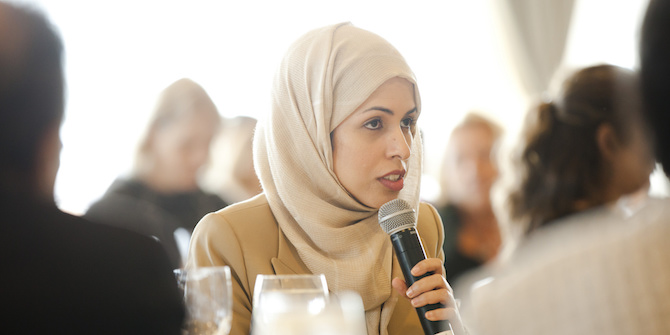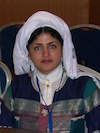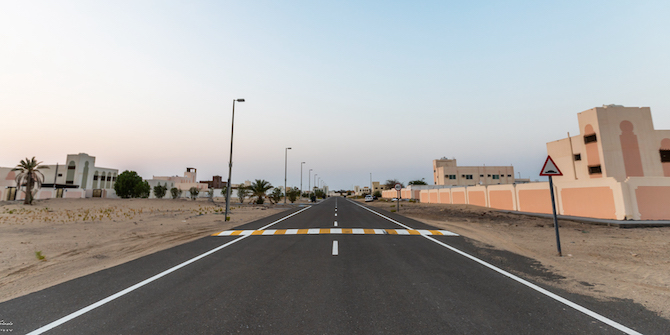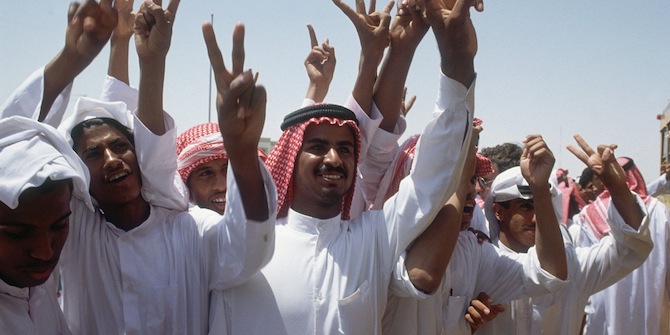by Hatoon al-Fassi

When considering the significance of female suffrage in the Gulf, one is tempted to immediately assert that it is obviously important. But, in fact, tackling this issue also requires questioning to whom it is important – to men, to women, to society, to the state or to history? Each question will lead us in a different direction.
Female suffrage also has different meanings and effects in each GCC country. Women entered the realm of politics in the Gulf very recently – in 1994 to be precise, when Omani women in Muscat became the first in the region to be given the right to vote and stand in parliamentary elections.
GCC Women and Elections
| Country | Year of Female Suffrage | Level of Female Participation in Elected Bodies |
|---|---|---|
| Bahrain | 2002 | Municipal elections and elected house of parliament (Council of Representatives) |
| Kuwait | 2005 | Municipal elections and parliament (National Assembly) |
| Oman | 1994 | Municipal elections and elected house of parliament (Consultative Assembly) |
| Qatar | 1999 | National municipal council (Central Municipal Council) |
| Saudi Arabia | 2015 | Municipal elections |
| UAE | 2006 | National consultative council (Federal National Council), though not universal but through an electoral college |
Since then, women’s representation in the political systems of the Gulf States has varied in terms of size of representation, electoral mechanisms, political institutions and the power that these institutions retain. All Gulf women now participate in elections that relate to consultative Shura councils, national councils, municipal councils or parliaments.
Does having the right to vote, however, mean women in the Gulf are politically empowered?
No one can deny the transformation that women in the Gulf have experienced in the past four or five decades, reflecting the many developments the Gulf countries have undergone in the areas of education, economic welfare, and public participation, all of which were a result of the formation of modern national states, and welfare states, in the Arabian Peninsula, which comprises seven countries including the six members of the Gulf Cooperation Council (GCC) and Yemen.
Political participation in the region is still a hotly debated issue, especially when it comes to gender. Women tend to be given either the minimum quota or least influential positions; this is justified through a variety of arguments, including appeals to religion, tradition, or claims regarding lack of qualifications and experience. Left unmentioned is the state’s wish to keep women under control, or within specific limits of political space. Decorative, or token, participation – without real power – is also often all that is granted. Nonetheless, it is important to keep in mind that there genuine steps forward in the region, such as moves in the United Arab Emirates to populate their ministerial cabinet with women, appoint women to the Federal National Council (FNC) to compensate the low number of elected women, and appoint one of these women as the speaker of the council.
Accomplishments aside, one cannot deny the large gender gap in broader political representation. In terms of legal political empowerment, there are three areas to assess: access to power, minority in representation, and contradiction between progressive and regressive steps and legislation.
Access to power
Though women are increasingly receiving positions in government, whether appointed or elected, it is uncertain how much influence these positions wield on the ground. Most positions for women have been in ministerial cabinets, shura councils, or municipal councils, where they are appointed or elected, yet do not have substantial influence in policymaking. The Saudi and Omani shura councils may however be exceptions, as they are ostensibly open to those who prove themselves qualified, with recommendations based on research.
Minority in representation
Although the gender balance in Gulf populations is nearly 1:1, state development projects are not proportionately representative of the female population in any level in the public sphere, whether economic, administrational, ministerial, diplomatic, leadership, financial, or educational. The Saudi Program of Transformation 2020, for instance, identified that the percentage of women in leadership positions is a mere 1.27 percent, compared to the world standard of 36 percent. Women have never been equal or even nearly equal with men in official positions or representation. The only forum found in Saudi Arabia in which gender representation is equal is in the National Dialogue meetings.
In March 2017, Saudi Arabia, in an unprecedented step, appointed five women to leadership positions in the fields of finance and social affairs. Despite this positive step, however, none of the problematic laws that hinder women’s legal rights were addressed (though one of these laws was lifted when women gained the right to drive cars on 26 September 2017, to come into force in June 2018).
Perhaps the main problem of underrepresentation of women in the Gulf, especially in elected positions, comes from the lack of a quota that could balance the scale. This absence has allowed, for example, the case of having one woman only out of 50 in Kuwait’s Majlis al Umma.
Contradiction between progressive steps and regressive laws
In terms of laws that are written and laws that are yet to be codified, women lack a substantial say, with legislatures remaining the realm of men. Nonetheless, laws do explicitly make reference to women, with legislation regarding women’s position vis-a-vis family, labour, crime, or civil service. The overwhelming absence of females from legislatures – where they exist in the Gulf – allows for the issuance of laws that openly discriminate against, or are at least not in favour of, women. For example, although Qatar established the Supreme Council of Family in 2002, with a very ambitious vision and plans to empower women (as detailed in Qatar’s ‘Vision 2030’), the state decided to abolish the council in 2014.
Furthermore, in Saudi Arabia, women were allowed to vote and run in municipal elections in 2015, though a caveat was issued banning any gender mixing during the campaigns. After women won 21 seats in the municipal councils, a new law was issued, stating that the council should be completely segregated from men and women should have a separate lift and room, with a closed-circuit television system to communicate with their counterparts. Such rules tend to nullify the power and impact of the advancement of female participation in the public sphere.
Finally, the relationship between women and the state is yet to be problematised and analysed. As a result, the steps necessary to remedy inequities faced by women in the Gulf states are very clear, yet putting this into place could prove difficult. Revising and reforming archaic laws must be a top priority, with women playing an integral role in this change and reform.
 Hatoon Al-Fassi is a women’s rights activist and an associate professor of women’s history at King Saud University in Saudi Arabia and at the International Affairs Department at Qatar University. She is the author of Women in Pre-Islamic Arabia: Nabataea. She tweets at @HatoonALFASSI
Hatoon Al-Fassi is a women’s rights activist and an associate professor of women’s history at King Saud University in Saudi Arabia and at the International Affairs Department at Qatar University. She is the author of Women in Pre-Islamic Arabia: Nabataea. She tweets at @HatoonALFASSI
In this series:
- Introduction by Courtney Freer
- A Survey of Knowledge of and Attitudes toward Article 153 among Kuwaiti Citizens by Justin Gengler
- Saudi Women: Navigating War and Market by Madawi Al-Rasheed
- Disciplinary Violence in Kuwait by Alanoud Alsharekh
- The Influence of Islamist Rhetoric on Women’s Rights by Courtney Freer
- Gender equality in Iraq and Iraqi Kurdistan by Zeynep Kaya
- Sexual Violence against Women during Displacement by Zeina Awad
- Women’s Access to Justice for Gender-Based Violence in Universal and Regional Human Rights Law by Lisa Gormley
- Assessing the Role of Security Forces on Women in Conflict Zones: Perspectives from International Law by Antonia Mulvey






